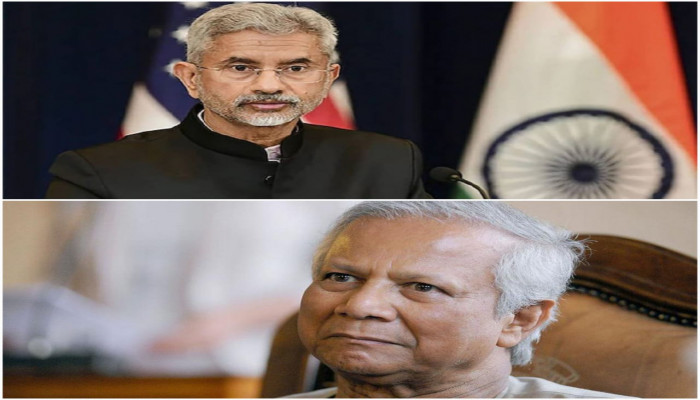'India has longest Bay of Bengal coastline', Jaishankar rebukes Yunus’ ‘cherry-picking’ claims
- In Reports
- 04:33 PM, Apr 03, 2025
- Myind Staff
External Affairs Minister S. Jaishankar emphasised India's commitment to its responsibilities within the Bay of Bengal Initiative for Multi-Sectoral Technical and Economic Cooperation (BIMSTEC), noting that India also has the longest coastline along the Bay of Bengal. He further noted that India views cooperation as a holistic approach, not a matter of cherry-picking. His comments were made in response to recent remarks by Bangladesh Chief Adviser Muhammad Yunus, which sparked controversy. Yunus had also called on China to establish an economic base in Bangladesh and asserted that his country was the sole "guardian of the ocean" in the region.
Speaking at the 6th BIMSTEC Summit in Thailand, Jaishankar emphasised nations' shared interests and concerns surrounding the Bay of Bengal. He noted, “The nations around and proximate to the Bay of Bengal have both common interests and shared concerns. Some of it emanates from our history, where other priorities overrode the well-being of this region.”
Highlighting India’s pivotal role in BIMSTEC, he stated, “India is aware of its special responsibility in regard to BIMSTEC. We, after all, have the longest coastline in the Bay of Bengal, of almost 6,500 km.”
Jaishankar further pointed out India’s geographical significance: "India shares borders not only with five BIMSTEC members, connects most of them, but also provides much of the interface between the Indian Sub-continent and ASEAN.”
He also underscored the growing importance of India’s Northeast as a connectivity hub for BIMSTEC, explaining, “Our North-Eastern region in particular is emerging as a connectivity hub for the BIMSTEC, with a myriad network of roads, railways, waterways, grids and pipelines. Furthermore, the completion of the Trilateral Highway will connect India’s North East all the way to the Pacific Ocean, a veritable game-changer.” He reaffirmed India’s commitment to regional cooperation, “We are conscious that our cooperation and facilitation are an essential pre-requisite for the smooth flow of goods, services and people in this larger geography. Keeping this geo-strategic factor in mind, we have devoted increasing energies and attention to the strengthening of BIMSTEC in the last decade.”
“We also believe that cooperation is an integrated outlook, not one subject to cherry-picking," he said further.
In a post on X, the External Affairs Minister shared key points from his address at the BIMSTEC Summit in Bangkok.
He highlighted, “Nations around and proximate to the Bay of Bengal have both common interests and shared concerns.”
He highlighted India's role in regional connectivity by stating, “Our North-Eastern region, in particular, is emerging as a connectivity hub for the BIMSTEC. The IMT Trilateral Highway will connect India’s North East all the way to the Pacific Ocean.”
He stressed security challenges and wrote: "BIMSTEC needs to recognise the seriousness of cyber security, counter-terrorism, human trafficking, illegal narcotics trade and other associated activities. We need to create the necessary frameworks to deal with them effectively. Nor can we disregard the ever-present dangers of extremism, radicalisation and terrorism.”
The BIMSTEC summit will provide a platform for Prime Minister Narendra Modi to meet with Nepal’s Prime Minister KP Sharma Oli, Bangladesh’s interim leader Yunus, Myanmar’s military junta chief Min Aung Hlaing, and other regional leaders, according to news agency PTI.
Relations between India and Bangladesh have cooled since Yunus took charge of the interim government following the ouster of Prime Minister Sheikh Hasina in August 2024. India has expressed concerns over rising violence against Hindus and the growing influence of hardline Islamist groups in Bangladesh.
During his tour to China last week, Yunus encouraged Beijing to extend its economic footprint in Bangladesh. He also made a controversial remark, suggesting that the landlocked nature of India’s northeastern states could present a financial opportunity for Bangladesh.
Yunus met President Xi Jinping during his visit to China and signed nine agreements with Beijing. He stated, “The seven states of India, the eastern part of India, are called the seven sisters. They are a landlocked region of India. They have no way to reach out to the ocean.”
Describing Bangladesh as the “only guardian of the ocean" in the region, he suggested that this presented a significant opportunity and could serve as an extension of the Chinese economy. His remarks, which surfaced on social media on March 31, sparked strong reactions from Indian political leaders across party lines, who condemned them as “shameful" and “provocative."







Comments